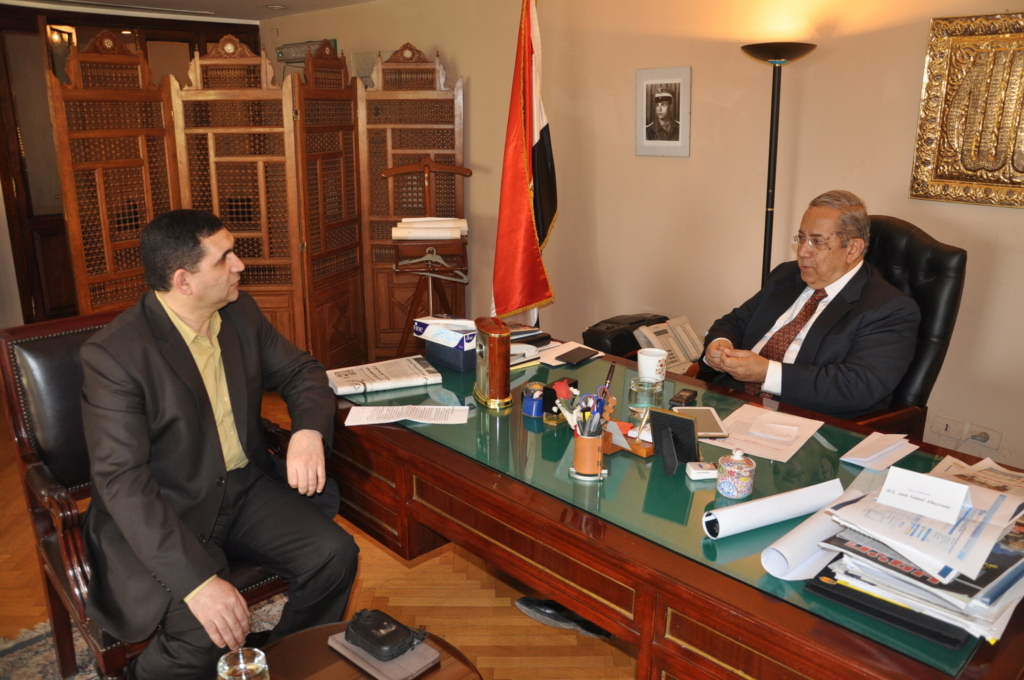Home » Interviews » Al-Bayoumi:The struggle between the euro and the dollar casts a dark shadow over the pockets of the Britons
Interviews
Al-Bayoumi:The struggle between the euro and the dollar casts a dark shadow over the pockets of the Britons
Published
2 years agoon
By
Huda
The name of Ambassador Jamal Al-Din Al-Bayoumi was associated with historical periods of Egyptian-British relations. Al Bayoumi had close human and diplomatic relations with many personalities in the English society, through his continuous work as Secretary General of European Participation at the Ministry of International Cooperation and as a former assistant to the Egyptian Foreign Minister. We asked him several questions about the economic situation in Britain and this was the interview.
Interviewed by Mohsen Hasan
– To begin with, where is the economic index heading in the European continent, especially Britain?
According to global economic forecasts, the world’s economies are achieving negative growth rates. That is, their economies are shrinking. This applies, of course, to Britain, which was affected the most by the results of its exit from the European Union. Britain seeks to counter the negative effects of this withdrawal, which appeared in the sectors of trade, investment, employment and freedom of passage. In addition to assimilating Ireland’s position opposing Britain’s withdrawal, many steps were taken to limit these effects, and I cannot fail to mention here that Egypt and Britain agreed at an early stage to conclude a parallel agreement that preserves the interests and advantages that the two countries used to exchange within the framework of the Egyptian-European partnership agreement (2004).
– Apart from BREXIT, are there other factors that led to the decline in the economic index of the two exiting parties?
Of course, there are many factors, including the prolonged Covid-19 crisis, and more recently the Russian-Ukrainian war, which impeded economic growth, trade and energy supplies from Russia. The boycott decisions taken by NATO countries and the European Union affected the economic performance of all countries of the continent, to a greater or lesser extent, which crucially affected Britain.
– Do you expect a quick recovery from this economic downturn?
No one expects a quick recovery for what is happening in Europe and Britain, and in the best scenarios, if the parties to the (East / West conflict) raging in Ukraine manage to reach a current solution that saves the face of all parties, then the expectation is that the European economy (may) begin to recover at the beginning of 2025.
– How do you assess the consequences of Brexit so far?
Britain has lost many opportunities for employment, trade and investment, joint cooperation and open borders, and there is no doubt that most members of the European Union do not mind continuing the trade exchange relations as they were at the time of Britain’s membership. I think this is the case now, and that trade flows – in the end – have not been affected much. It is estimated that Britain has now lost more than 45,000 jobs with its exit. It is not easy to replace this loss in the short term.
– In your opinion, what are the most significant steps that Britons should take in the future?
I think that the British elites began some time ago to realize the mistake of the decision to leave the European Union, and even some leaders tried to propose the idea of a gradual return. However, the idea was resisted, especially by circles that favor an alliance with the United States of America, which, in turn, is happy to see the European Union disappear as a whole, because it finds in the euro a threat to the hegemony of the dollar.
American diplomat friends do not hide these wishes, especially in the face of the independence trend led by countries such as France. In my opinion, the currently available and possible middle path is for Britain and the European Union to maintain all possible relations that existed in the trade of goods and services and the movement of capital and investments as much as possible.
– As an active follower of international relations, what and what does not satisfy you in Egypt’s economic relations with the United Kingdom?
After a period of estrangement in relations between Egypt and Britain during the colonial phase and the events of the Tripartite Aggression of 1956, these relations gradually returned when the language of interests prevailed between countries and the principle of (no permanent enmities, no continuous friendships) prevailed.
The end of the colonial era and the establishment of the European Common Market (1957) contributed to the emergence of the policy of expanded Europe, which took its course until it reached the stage of Britain’s accession, which was approved by the government of Edward Heath in 1972 and membership was implemented in January 1973. In light of this formation, Egypt concluded the Comprehensive Cooperation Agreement with the European Union in 1976 to begin a new phase of relations.
In fact, I consider British diplomacy to be among the most ancient in the world with traditions and emulated systems, however, what bothers me sometimes – and not much or frequently – is the condescending look of some politicians and diplomats in Britain. This is what I used to respond to firmly and with facts that make the speaker return to his/her senses. Nevertheless, I personally succeeded in forming many friendships with the Britons throughout my work and during the Egyptian-European negotiations (1995/2001), as several cooperation occurred with many of them.
– Given the loss of 30,000 jobs for Britons in Europe, what are the available alternatives for employment in Britain, from your point of view?
The problem is that the decision to leave the European Union, BREXIT, was taken by a (marginal) majority and with relative haste, and now Britain is paying the price. Especially after its exclusion from the European free trade area after a year passed of its exit, and I do not think that there is a way to compensate for the subsequent losses. The whole world has entered into a vortex of the economic effects of the Covid-19 pandemic and the war in Ukraine. Today, a majority of the British people voted in an opinion poll, expressing remorse for the withdrawal and its results.
– Has the effectiveness of the UK’s foreign relations been affected after leaving the European Union?
Britain’s relations were certainly affected, firstly with the twenty-seven members of the Union, and secondly with the European neighboring countries and the countries that signed agreements for neighborhood or participation. Britain has begun to conclude alternative agreements with countries that accept this in order to preserve the relations that existed at the time of Britain’s membership in the Union. A two-year consecutive decline in British business activity makes sense. Not only because of the results of the BREXIT, but because the world and most of the economies of the European countries were affected by the two crises of Covid-19 and the Ukrainian war, which made the matter more difficult, and it will remain so for a while. There is an idiom that says “There are many causes for it, but poverty is one”.
– According to the economic situation in Britain, can openness to the Middle East and the Gulf region represent a promising alternative for the British?
Of course, Britain is trying to find alternatives, but it faces two sets of difficulties to achieve this: The first is related to answering the question of which markets can represent a parallel alternative to the European Union. The second, which we can directly see if we realize that the gross domestic product of the Arab countries combined (22 countries) is less than the GDP of Britain, and its total foreign trade is less than that of Singapore. So what alternative are we talking about!
– From a personal point of view: Who is worthier of stimulating the British economy after the 2024 elections? Boris Johnson or Rishi Sunak? And why?
It is not the prime minister who matters, despite our appreciation for the importance of the personal touch in addressing and persuading the relevance of the political or economic choice. Rather, what matters is the consensus of the majority to choose between continuing the BREXIT and isolation, or trying to return. In the latest opinion poll, a simple majority voted for the idea of returning to the EU, however, the question remains: If Britain decides to return, will all EU member states accept that? And what price will Britain have to offer these countries?
– With regard to the British economic planner: What is the best measure towards the recurrence of labor strikes in various British sectors?
In my humble opinion, according to study and experience – there is no optimal economic solution, economic solutions are many and varied. And you can accept something and its opposite. When Germany ran a budget deficit in 1983, the usual solution was to cut spending and raise taxes. However, the Minister of Economy at the time, Autograph Lambsdorf, suggested cutting taxes to encourage enterprises to increase production and employment. He also suggested reducing the health benefits provided to the citizen. It is a solution that was disagreed on and rejected by the government of Helmut Schmidt, and fell when it confronted the Parliament with this option. The Parliament then voted against it and brought it down.
Then the government of Helmut Kohl came with the same Minister of Economy that applied that “strange” policy, in which he lowered taxes on institutions, imposed a fee of several (marks) on every bill for free medicine, and another symbolic fee for those who stay in the hospital for more than a week. The idea succeeded, and the budget achieved a surplus of 60 billion marks after a deficit of 40 billion.
– The question remains open: What is the solution for Britain?
The solution, in my opinion, for Britain and others, is to conduct societal dialogue and negotiations with unions to reach a program that enjoys general consensus and majority support. Especially since the crisis hit the entire world, and Britain is not alone in this. There are no difficult decisions that include freezing wages for a period and absorbing inflation by reducing the amount of money with the temptations of raising the interest rate and working to increase exports to markets the size of China (the second largest importer in the world) and America (the largest importing market in the world), especially since the latter is not satisfied with the strength of the EU.
– In light of the worsening crises among the Britons; How do you see the future of Britain’s exit from the European Union? Can it join the EU again?
The current British crisis is caused by the largest crisis in the global economy affected by the war in Ukraine, and the Covid-19 pandamic. Of course, the isolation of Britain from the European Union limits the ability of the British economy to adapt to these conditions. Especially since (the American alternative) is not in the best condition. America’s indebtedness reached an unprecedented level, and its economic growth rates are shrinking. However, we realize that the British economy is so large that it can restore its balance in the long run. As for Britain’s restoration of its membership in the European Union, I said in my previous answer that even if there was a British agreement to return, there is no guarantee that many EU countries would not oppose such a step.
– How is your relationship with the British society diplomatically?
Most of the diplomats I knew or other Britons who worked in Egypt felt affection for Cairo. Which is understandable. In fact, the reputation of Egyptian diplomacy in the world is great. The relations of the two countries got a good boost as a result of the Egyptian peace initiative and the invitation of President Sadat to a “state visit” in Britain. The Egyptian-European partnership negotiations came to give impetus to these relations. Britain supported us in our stances, especially in the agricultural negotiations. As it was one of the members opposed to the European agricultural policy because it is expensive, and it was the focus of damage to Britain, Germany, and countries that have no interests in agricultural support, and do not benefit from it and pay its cost.
This was the focus of the dispute that erupted at the time of Prime Minister, Margaret Thatcher, and the situation reached the point where they formally asked us (and this is a secret that has not been publicized before) to continue attacking the European position on agriculture, provided that they support our requests from within. During that period, strong cooperation with Britain was established on the diplomatic level.
– What about your personal relationships on a human level?
It is also linked to the diplomatic aspect; At the same time as the agricultural consultations that I mentioned previously. A working friendship developed between me and the British ambassador in Cairo Sir David Platwick. Before that, friendship and fellowship brought me together with British ambassadors in Cameroon at the time of my service there, the last of them is Ambassador William Quantrill, as we traveled together, and our two wives were accompanying us, on a business trip based on the summons of the President of Equatorial Guinea, President Obiang, and we drove 1,200 km back and forth.
Before that, in 1977, I was associated with their consul in Rio de Janeiro Alan Monroe, who later became an undersecretary of the Ministry of Foreign Affairs and received the title “Sir”. When he came on a visit to Cairo, he asked their ambassador for a lunch invitation to be made in honor of our friendship. Then we met again by chance at an economic conference called by the UAE Ministry of Economy in Abu Dhabi.
Also, before that, Dr. Abdel Qader Hatem commissioned me in 1971 to accompany his guest, Andrew Foulds, the Labor representative in the House of Commons, and the secretary of the British-Egyptian-British Friendship Committee. He also held the position of Shadow Minister of Culture for the Labor Party. Together with our wives, we spent a 12-day visit between Cairo, Alexandria, Luxor and Aswan, and our friendship continued for years, and I always visited him whenever I traveled to London until he died, may his soul rest in peace.
Then Representative Andrew Foulds asked me to meet Martin Ennalds, Secretary of the Amnesty International Committee, in Cairo. He was on a delicate mission trying to help an Egyptian political prisoner who had been tried for treason because he had been attacking Egypt on a radio station broadcasting from Baghdad. And when the ruling of President Abd al-Salam Aref came, the prisoner was handed over to Egypt, where he was tried and sentenced to death. It was required that he is to be allowed to receive visitors. At the time, I was in a junior rank (primary secretary), but my superiors advised me to record his requests and submit them through the official route. And at that time, President Sadat issued a decision commuting his sentence to life imprisonment, and allowed him to receive visitors. Martin Ennalds, afterwards, honored me as I passed London on my way to Brazil.
You may like
-


Ahmed Reyad, an Egyptian Face-Reading Expert: Personality Analysis Inspires Self-Improvement and Societal Change!
-


Technical Expert Omar Ashraf to Arabisk London: I Hope to Establish a National Academy in Saudi Arabia to Educate Civil Aviation!
-


Season Five of Abdul Aziz’s Men Documentary With Exclusive Details

Rayyanah Barnawi has Altered Saudis’ View of Space

Lina Village: The Kingdom’s Well Site

Adeem Al-Fursan: A Novel Development Project in Riyadh

Ahmed Reyad, an Egyptian Face-Reading Expert: Personality Analysis Inspires Self-Improvement and Societal Change!

Saudi Arabia’s Cold Tourism in 2025

